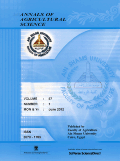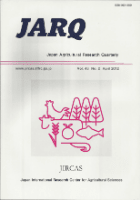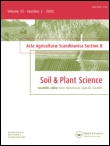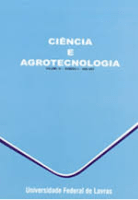
Agriculture-Basel
Scope & Guideline
Championing Innovation in Sustainable Farming
Introduction
Aims and Scopes
- Sustainable Agriculture Practices:
Research on methods and practices that promote eco-friendly agriculture while maintaining productivity and profitability. - Agricultural Technology and Innovation:
Studies on the application of modern technologies, including precision agriculture, robotics, and data analytics to improve farming efficiency. - Crop and Soil Management:
Investigations into soil health, crop rotation, nutrient management, and organic farming practices that enhance soil fertility and crop yield. - Pest and Disease Management:
Research on biocontrol methods, integrated pest management, and the impact of agrochemicals on pest and disease dynamics. - Food Security and Nutrition:
Analysis of agricultural practices that contribute to food security, nutritional quality of crops, and the socio-economic factors affecting food systems. - Climate Change Impact and Adaptation:
Studies focusing on the effects of climate change on agriculture and strategies for adaptation to ensure resilience in farming systems. - Biodiversity and Agroecology:
Research on the role of biodiversity in agricultural systems and its impact on ecosystem services and resilience. - Economic Analysis of Agricultural Markets:
Investigations into market dynamics, agricultural policies, and economic strategies that affect the agricultural sector.
Trending and Emerging
- Precision Agriculture Technologies:
An increase in research focused on precision farming technologies, including the use of drones, IoT devices, and data analytics to optimize crop production. - Biological Control and Eco-Friendly Practices:
Growing interest in biopesticides, biostimulants, and sustainable practices that enhance crop health and reduce reliance on synthetic chemicals. - Climate Resilience and Adaptation Strategies:
Research aimed at understanding and developing agricultural practices that can withstand the impacts of climate change. - Digital Agriculture and Smart Farming:
Emerging trends in the use of digital technologies, including machine learning and AI, for enhancing farm management and decision-making. - Soil Health and Regenerative Practices:
A significant focus on soil health, including studies on biochar, organic amendments, and practices that improve soil biodiversity and fertility. - Food Systems and Security Analysis:
Increased emphasis on the intersection of agricultural practices and food security, particularly in relation to socio-economic factors. - Sustainable Livestock Management:
Research into sustainable practices for livestock management, including nutrition, welfare, and environmental impacts. - Agroecological Approaches:
A rising trend in studies exploring agroecology and its role in enhancing biodiversity and ecosystem services in agricultural landscapes.
Declining or Waning
- Traditional Crop Breeding Techniques:
Interest in conventional breeding methods has waned as more emphasis is placed on genetic engineering and molecular breeding techniques. - Chemical Fertilizer Research:
There has been a noticeable decrease in studies solely focused on chemical fertilizers, likely due to a growing interest in organic and sustainable alternatives. - Insecticide Efficacy Studies:
Research directly assessing the efficacy of traditional insecticides is declining as integrated pest management and alternative biocontrol methods gain traction. - Conventional Soil Management Practices:
Research on conventional tillage and soil management practices is diminishing in favor of innovative practices that promote soil health and conservation. - General Agricultural Economics:
There is a decline in general economic analyses of agriculture as more specific studies focusing on sustainability and market dynamics are emerging.
Similar Journals

ANNALS OF AGRICULTURAL SCIENCES
Empowering the Agricultural Community Through Open Access ResearchANNALS OF AGRICULTURAL SCIENCES, published by Elsevier, stands as a leading open access journal dedicated to the multifaceted field of agricultural sciences. Since its inception in 2011, this journal has served as a pivotal platform for the dissemination of high-quality research, covering areas such as agronomy, animal science, horticulture, food science, plant science, and soil science. With an impressive Q1 ranking across multiple disciplines and notable positions in Scopus Ranks—including #6 in Animal Science and Zoology and #3 in Horticulture—this journal is recognized globally for its significant contribution to advancing agricultural innovations. The journal caters to a diverse audience of researchers, professionals, and students, providing them with open access to cutting-edge studies that address critical issues in agricultural productivity and sustainability. Its commitment to high-impact research ensures that articles contribute meaningfully to the scientific community, fostering advancements in agricultural practices and policies.

JOURNAL OF THE FACULTY OF AGRICULTURE KYUSHU UNIVERSITY
Pioneering Insights in Agricultural SciencesJOURNAL OF THE FACULTY OF AGRICULTURE KYUSHU UNIVERSITY is a reputable academic journal dedicated to advancing knowledge in the fields of agriculture and biological sciences. Published by Kyushu University, Faculty Agricultural Publications, this journal serves as a platform for researchers and professionals to share original research, innovative methodologies, and critical reviews that focus on biochemistry, genetics, molecular biology, as well as agronomy and crop science. Although the journal's coverage in Scopus has been discontinued as of 2020, it continues to hold significance within the academic community, evidenced by its rankings in the 20th percentile for significant categories. The journal welcomes contributions that push the boundaries of current agricultural practices and enhance sustainable development in the field. Researchers and students seeking to enrich their understanding of agricultural sciences will find invaluable insights and diverse perspectives within its pages. The journal’s commitment to fostering scientific dialogue remains clear, as it continues to be an integral resource for the agricultural academia landscape in Japan and beyond.

REVISTA DE LA FACULTAD DE CIENCIAS AGRARIAS
Leading the Way in Agricultural Research and Innovation.REVISTA DE LA FACULTAD DE CIENCIAS AGRARIAS is an esteemed academic journal published by UNIV NACIONAL CUYO, FAC CIENCIAS AGRARIAS, located in Chacras de Coria, Mendoza, Argentina. As a pivotal publication in the fields of Agronomy and Plant Science, it has achieved a commendable Q2 ranking in both categories, indicating its relevance and impact within the scientific community. Since its establishment as an Open Access journal in 2007, it has facilitated the dissemination of crucial research, fostering collaboration and innovation among researchers, professionals, and students alike. The journal's converged years from 2008 to 2024 allow it to present contemporary advancements and discussions related to agricultural practices and plant sciences. With a strong commitment to quality and accessibility, REVISTA DE LA FACULTAD DE CIENCIAS AGRARIAS provides a valuable platform for those engaged in the crucial exploration of sustainable agricultural methodologies and plant innovations.

Revista de la Facultad de Agronomia de la Universidad del Zulia
Innovating Agriculture: Insights from the Heart of VenezuelaWelcome to the Revista de la Facultad de Agronomia de la Universidad del Zulia, a key publication in the fields of Agronomy, Animal Science, Food Science, and Plant Science. Published by the Facultad de Agronomía, Universidad del Zulia, this journal aims to foster academic dialogue and disseminate impactful research that advances knowledge and practice within these disciplines. Operating under the ISSN 0378-7818 and E-ISSN 2477-9407, this journal offers a platform for both emerging and established scholars to share their discoveries and innovations. Despite its challenges, as reflected in its Q4 ranking across multiple categories in 2023, it remains a vital resource for the Venezuelan scientific community and beyond. Readers will benefit from a diverse array of studies and discussions that address contemporary issues in agriculture and related fields, helping inform best practices and policy. Engage with cutting-edge research from Venezuela and contribute to the development of agronomic sciences in the region.

JARQ-JAPAN AGRICULTURAL RESEARCH QUARTERLY
Bridging Science and Sustainability in AgricultureJARQ - Japan Agricultural Research Quarterly serves as a pivotal platform in the field of agricultural sciences, published by the esteemed Japan International Research Center for Agricultural Sciences. Established in 1973, this journal has a rich history and plays a critical role in disseminating significant research findings relevant to agronomy, crop science, animal science, ecology, and biotechnology. Despite its ranking in the lower quartiles, with impressive coverage from 1973 to 2024, it continues to attract contributions that enhance agricultural strategies and practices in Japan and beyond. The journal facilitates discussions that are essential for fostering innovation in agricultural methodologies and environmental sustainability. Accessible to a diverse audience, including researchers, academics, and practitioners, JARQ emphasizes the importance of advancing agricultural research and its implications for food security and ecological balance.

Pesquisa Agropecuaria Tropical
Advancing agricultural knowledge for a sustainable future.pesquisa Agropecuaria Tropical is a premier Open Access journal dedicated to advancing the knowledge and practices within the field of agronomy and crop science. Since its inception in 1971, this peer-reviewed journal, published by the Universidade Federal de Goiás, has played a pivotal role in disseminating high-quality research from Brazil and beyond. Operating under an Open Access model, it ensures that scholarly articles are freely accessible, thereby fostering greater collaboration and innovation. With a Scopus ranking placing it in the 32nd percentile among its peers in agricultural and biological sciences, and a current classification in the Q3 category of agronomy and crop science, the journal serves as an essential resource for researchers, professionals, and students alike. As it continues its publication journey from 2010 to 2024, it remains committed to contributing valuable insights and advancements in the agricultural sector, ultimately influencing sustainable practices and food security.

ACTA AGRICULTURAE SCANDINAVICA SECTION B-SOIL AND PLANT SCIENCE
Bridging Science and Practice in Agronomy and Soil ScienceACTA AGRICULTURAE SCANDINAVICA SECTION B-SOIL AND PLANT SCIENCE, published by Taylor & Francis AS, is a distinguished journal dedicated to the fields of Agronomy, Crop Science, and Soil Science. With an impressive impact factor, and categorized in Q2 for both Agronomy and Crop Science and Soil Science as of 2023, this journal is an essential resource for researchers, professionals, and students aiming to advance their understanding of soil-plant interactions and sustainable agricultural practices. Operating since 1992 and continuing through to 2024, ACTA aims to publish high-quality, peer-reviewed research that encourages the applicability of advanced scientific knowledge in real-world agricultural settings. While the journal is not open access, it remains widely accessible through institutional subscriptions, reflecting its commitment to disseminating essential findings and fostering innovation in soil and plant science worldwide. Nestled in the vibrant academic environment of Norway, ACTA AGRICULTURAE SCANDINAVICA serves as a key platform for nurturing groundbreaking research that informs sustainable agricultural policies and practices globally.

CIENCIA E AGROTECNOLOGIA
Unlocking Insights in Agronomy and Animal ScienceCIENCIA E AGROTECNOLOGIA, published by UNIV FEDERAL LAVRAS-UFLA, is a vital open-access journal since 2005 that serves as an influential platform for disseminating research in the fields of Agronomy, Animal Science, Food Science, Soil Science, and Veterinary Science. With its ISSN 1413-7054 and E-ISSN 1981-1829, this journal is recognized for its contribution to science and technology advancements in agriculture, particularly in Brazil, fostering knowledge exchange among researchers, professionals, and students. Currently ranked in the Q2 quartile for Agronomy and Crop Science, Animal Science and Zoology, and in the Q3 quartile for Food Science and Soil Science, it demonstrates a solid international standing in the relevant Scopus indices. The journal's commitment to open access ensures that critical research findings are freely available, enabling a broader impact and encouraging collaborative advancements in agritech. As the journal looks towards its converged years from 2007 to 2024, it continues to uphold its objectives of promoting sustainable practices and innovation within the agricultural sciences.

Scientific Papers-Series A-Agronomy
Connecting Researchers for a Sustainable TomorrowScientific Papers-Series A-Agronomy is a premier academic journal dedicated to the field of agronomy, published by the University of Agronomic Sciences and Veterinary Medicine Bucharest. With an emphasis on innovative research and practical applications, this journal serves as a vital platform for disseminating new findings in agricultural science, sustainable practices, and crop management strategies. Though the journal currently operates under traditional access options, it remains pivotal in supporting the academic community in Romania and beyond. The ISSN (2285-5785) and E-ISSN (2285-5807) ensure that the work published is easily accessible to researchers and practitioners alike, fostering the exchange of knowledge and advancements within the agricultural sector. By continually addressing contemporary issues in agronomy, Scientific Papers-Series A-Agronomy strives to promote sustainable agricultural practices and enhance food security, making it an essential resource for professionals, students, and researchers keen on advancing their understanding and expertise in this critical field.

TROPICAL AGRICULTURE
Cultivating knowledge for sustainable development in agriculture.Tropical Agriculture is a reputable journal dedicated to advancing knowledge and research in the fields of Agronomy and Development, with a particular emphasis on tropical farming practices and agricultural innovation. Published by the University of the West Indies, this journal serves as a crucial resource for researchers, professionals, and students engaged in the complexities of agriculture in the tropics. Established in 1979, it has witnessed significant contributions and continues to facilitate scholarly discussions through its quarterly publications. While the journal currently holds a Q4 ranking in both the Agronomy and Development categories, its commitment to fostering research excellence positions it as a pivotal platform for emerging studies and regional agricultural advancements. Although not an open-access publication, it provides critical insights and localized research that greatly benefit the agricultural community, particularly within the Caribbean context. Researchers and professionals in the field can rely on this journal for insightful content on tropical agricultural challenges and developments, enhancing knowledge dissemination and application across related disciplines.